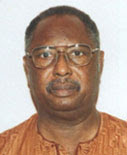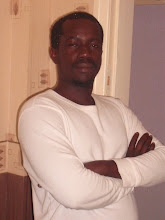
The Special Rapporteur on Freedom of Expression of African Commission on Human and Peoples' Rights, Madam Faith Pansy Tlakula, has called on the government of The Gambia to immediately decriminalize all repressive media laws in order to guarantee freedom of speech and freedom of expression in the country.
Madam Faith Pansy Tlakula made the statement on Saturday during the 46th Ordinary Session of the Commission, which kicked off in the Gambian coastal city of Brufut on Wednesday, November 11, 2009. She said the current media situation in the Gambia is unacceptable, and therefore urged Yahya Jammeh's government to repeal repressive laws and respect 'Article 9 of the African Charter on Human and Peoples' Rights'.
Tlakula also told the session that she had sent three letters to president Jammeh in June concerning the deterioration of press freedom in the country. In one of the letters, she said, president Jammeh's attention was drawn to the arrest and detention of 7 Gambian journalists, which seriously threatened free speech and undermined the Universal Declaration on human rights in Gambia. The concern of the lone female detainee and a nursing mother of a seven month old baby, Sarata Janneh-Dibba was raised in the letter,Tlakula told the session.
Ms Pansy Tlakula also asked president Jammeh in one of the letters, to withdraw threats made against Imam Baba Leigh, who happened to differ in opinion on the sensitive issue of female circumcision.
According to the Rapporteur on Freedom of Expression, a letter of appreciation was also sent to the Gambian leader after he had set the journalists free through a presidential pardon.
Although the Commission had asked the African Union to "authorize and provide extra-budgetary resources to the African Commission to ensure that the 46th Ordinary Session is convened and held in Addis Ababa, Ethiopia, or any other Member State of the African Union, in the event that [president Yahya Jammeh] does not withdraw his threats and the Government cannot guarantee the safety and security of the members and staff of the African Commission and the participants of the 46th Ordinary Session", president Jammeh never withdrew his threats. Click here to read the Commission's Resolution on Gambia, done in Dakar, Senegal, from October 5-11, 2009.
A day after the session opened in Brufut, the West African representative of the International Humanist and Ethical Union, Leo Igwe, brought the attention of the Commission to human rights violations in the Gambia when "government agents and some witch doctors from Guinea raided villages and homes, abducted hundreds of mainly elderly persons alleged to be witches and wizards, took them to some secret locations where they were tortured and forced to drink magical concoctions. Some died after taking the magical substance, while others developed severe health complications". Below is his entire statement in verbatim:
The Chairperson
The International Humanist and Ethical Union (IHEU) would like to draw the attention of the Commission to gross human rights violations that are committed because of fear of witchcraft across the region.
In Africa , the belief in witchcraft is strong, common and widespread. Over the years, claims of witchcraft have been used to abuse the universally recognized human rights enshrined in the African Charter on Human and People's Rights. In many African countries, to call somebody a witch automatically makes the person unqualified for human rights protection. To accuse somebody of witchcraft is like passing a death sentence on that person. Those accused of witchcraft are tortured, persecuted and killed. They are subjected to cruel, inhuman and degrading treatment by gangs, mobs, pastors, witch doctors, parents and family members in the name of exorcism or to elicit confessions. Those alleged to be witches and wizards are victims of jungle justice, extrajudicial killing, forced exile and disappearance.
In Africa those abused in the name of witchcraft are mainly the vulnerable members of the population—the poor, the elderly, women, children and people with disabilities.
IHEU has received reports of witchcraft related human rights abuses in many countries across the region.
In the Gambia, government agents and some witch doctors from Guinea raided villages and homes, abducted hundreds of mainly elderly persons alleged to be witches and wizards, took them to some secret locations where they were tortured and forced to drink magical concoctions. Some died after taking the magical substance, while others developed severe health complications. This state-sponsored witch hunt is in breach of Gambia 's human rights obligations under the African Charter.
In Malawi a magistrate's court has convicted two people for practicing witchcraft. In October, Emily (62) and James Kunjes (68) were sentenced to five years imprisonment with hard labour for killing two members of their community through magic. In Kenya, at least 15 women suspected to be witches were killed last year in a deadly witch hunt that occurred in some parts of the country. Relatives of those alleged to be witches and wizards continue to live in fear.
In the Democratic Republic of Congo, thousands of children alleged to be witches and wizards have been driven out of their homes and forced to roam the streets.
And in Nigeria, in Cross River and Akwa Ibom states, children accused of witchcraft are abandoned, beaten, slashed with knives, bathed with acid or lynched by parents, family and community members. Some of these so called child witches are chained and starved, some have been tortured to death by unscrupulous pastors during deliverance ceremonies. Also human rights activists working to defend the rights of those accused of witchcraft have been at risk. They have suffered attacks, threats, intimidation and harassment. In July, agents of a self-proclaimed witch exorcist and founder of the Liberty Gospel Church, Helen Ukpabio, raided a centre for the rehabilitation of child victims in Eket in Akwa Ibom state. They attacked the organizers of a child rights conference in Calabar in Cross River state.
In Ghana, women accused of witchcraft are attacked, persecuted and killed. Some of them fleeing persecution have taken refuge at a camp in Gambaga in the Northern Region. Those alleged to be witches and wizards suffer similar fates in Angola, Tanzania, Uganda, Cameroon, Zimbabwe, Sierra Leone, Liberia etc.The witch hunts in many African countries are not isolated attacks but an organized campaign, a silent and systematic elimination of anybody alleged to be a witch or a wizard.
IHEU calls on the Commission to issue a resolution condemning witch hunts and witchcraft related human rights abuses in Africa. IHEU requests the Special Rapporteurs on the Rights of Women in Africa, on Refugees, Asylum Seekers and Internally displaced Persons in Africa, on Human Rights Defenders in Africa to raise issues concerning witchcraft related abuses with state parties during their promotional missions.
IHEU calls on the governments of the Gambia, Nigeria, Malawi, Kenya, Zimbabwe, South Africa, Uganda, Tanzania, Cameroon, Sierra Leone, and Liberia to fulfill their commitments under the African Charter on Human and People's Rights by improving the quality of education, law enforcement and the justice system.
IHEU urges all state parties to take all necessary legal and administrative measures to combat all human rights abuses that are committed in the name of witch hunts. Source: Senegambianews.com


No comments:
Post a Comment